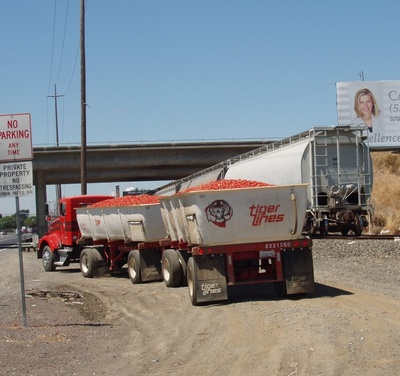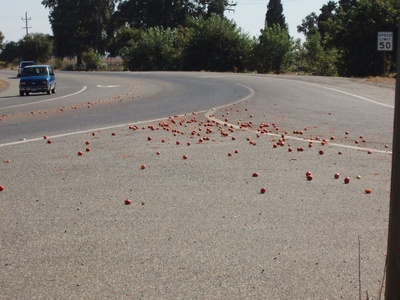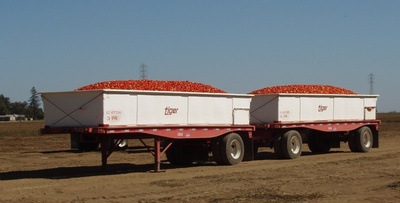These lovely vehicles are seen throughout the area during the summer months. And the products they haul are seen all over the roadways during the summer months.
The huge white bins are filled to the brim with processing tomatoes. These are made into tomato sauce, tomato paste, ketchup, salsa, etc. Things that need tomatoes, but don't have to look pretty like the ones in the produce aisle of the grocery store. Canning tomatoes are small and have a thick skin to survive the harvesting and transporting process.
The tomatoes you see in the grocery store have a thinner, more tender skin. They are generally hand picked and boxed before transport since the automated harvesting techniques would crush and/or bruise the tomato.
California produces 90-95% of the processing tomatoes used in the United States. Yolo County is the second largest producer in the state.
Local Employment
 A fair number of the drivers locally are UCD students. During spring quarter, tomato hauling companies have placed ads in The California Aggie and had booths at the summer job fair. Many companies recruit and train UCD students heavily for several reasons.
A fair number of the drivers locally are UCD students. During spring quarter, tomato hauling companies have placed ads in The California Aggie and had booths at the summer job fair. Many companies recruit and train UCD students heavily for several reasons.
- The harvest runs from Mid-July to Mid-September. This coincides with the UCD Summer break better than other schools that return to class in late August.
- UCD Students are generally intelligent and pick up things fast, so the learning curve is shorter, steeper and more cost effective.
- Davis students are only looking for a summer job, and aren't too upset when the season ends (Usually they are pretty happy about it).
- Unitrans drivers already have a class B commercial license, so there is even less training. They just need to upgrade their class, add an endorsement to their pre-existing license, and familiarize themselves with the vehicles.
- Two companies that have historically hired students are Morning Star Trucking, and Mike Lowrie Trucking. There may be others.
- Mike Lowrie stopped hiring student drivers in the Summer of 2004.
- Morning Star Trucking requires that you be 21 years old. This is an insurance issue.
What to expect if you do work
- Get paid by the load - This is not an hourly position, you get paid by the load, so slow days can mean lots of sitting around not earning any money. But once the season is in full swing, there is lots of work.
- Lots of work. A typical day can run from 8-16 hours depending on where the loads go.
- No days off. Unless you get approval WAY in advance, most places have so much work they can barely keep up. A truck out of service is a cramp in the planning, and throws stuff off.
- No social life. You will be working, or sleeping, and that's about it. Plus the hours vary and are unpredictable so you can't really plan out to meet people too well.
- No Alcohol. The legal limit for a commercial driver is .04 (CA VC §23152[d]). That's 1/2 of what you need to drive a standard car. When you are off work for potentially as short as 8 hours. Knocking back a few after work may be enough to make you register when you start again. The common phrase is that you can stand outside a bar and say beer three times and register a .02.
Why are there so many on the road?
 You can tell where every bump on a road is around here, because there is always a nice spread of tomatoes just past it where the fallen tomatoes have come to a halt.
You can tell where every bump on a road is around here, because there is always a nice spread of tomatoes just past it where the fallen tomatoes have come to a halt.
So many people will ask why they are transported open top. The reasons are multiple.
- Time - To tarp a load would mean hiring someone to tarp these loads, untarp them for state licensed grading (required of every load), retarping, and then untarping again at the cannery.
- Quality - A tarp would trap heat in the tubs, and potentially degrade the quality of the product.
- Hurried Loading - With some loads being picked in as little as 15 minutes, and a charge per load by the hauler, a lot of growers try to get as many tomatoes in as few trailers as possible. This means filling them to the brim and a little over in order to save costs.
Yes, a truck can be ticketed for dropping tomatoes, but the incidence rate is so low that it is calculated risk.
RogerClark worked as a driver and dispatcher for three summers.
SethNagao worked as a tomato truck driver for one summer and Mike Lowrie Trucking for two.
photo request: one of those white bins being filled alongside a harvester. Also, a close-up shot of the tomatoes.





